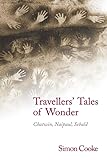Travellers' Tales of Wonder : Chatwin, Naipaul, Sebald / Simon Cooke.
Material type: TextPublisher: Edinburgh : Edinburgh University Press, [2022]Copyright date: ©2013Description: 1 online resource (216 p.) : 4 B/W illustrations 1 additional cover imageContent type:
TextPublisher: Edinburgh : Edinburgh University Press, [2022]Copyright date: ©2013Description: 1 online resource (216 p.) : 4 B/W illustrations 1 additional cover imageContent type: - 9780748675463
- 9780748675470
- 372.1821 22
- online - DeGruyter
| Item type | Current library | Call number | URL | Status | Notes | Barcode | |
|---|---|---|---|---|---|---|---|
 eBook
eBook
|
Biblioteca "Angelicum" Pont. Univ. S.Tommaso d'Aquino Nuvola online | online - DeGruyter (Browse shelf(Opens below)) | Online access | Not for loan (Accesso limitato) | Accesso per gli utenti autorizzati / Access for authorized users | (dgr)9780748675470 |
Frontmatter -- Contents -- List of Illustrations -- Acknowledgements -- Introduction: The Wonder that Came Later -- I. ‘Horizon of expectations’: Travels in Literary History -- 1. A Question of Form: Genre and the Journey -- 2. ‘An End to Journeying’: Travel and its Discontents in Late Modernity -- 3. Forms of Recovery and Renewal: Travels in Contemporary Literature -- II. Readings in Contemporary Travellers’ Tales of Wonder -- 4. Bruce Chatwin and the ‘modern WONDER VOYAGE’: In Patagonia (1977) -- 5. V. S. Naipaul and the ‘gift of wonder’: The Enigma of Arrival (1987) -- 6. W. G. Sebald’s Travels through ‘das unentdeckte Land’: Die Ringe des Saturn (1995) -- Afterword: The ‘unlimited vicissitudes of travelling’ -- Bibliography -- Index
restricted access online access with authorization star
http://purl.org/coar/access_right/c_16ec
Exploring travellers’ tales of wonder in contemporary literature, this study challenges a sensibility of disenchantment with travel. It reassesses travel writing as an aesthetically and ethically innovative form in contemporary international literature, and demonstrates the crucial role of wonder in the travel narratives of writers such as Bruce Chatwin, V.S. Naipaul, and W.G. Sebald. Their ‘travellers’ tales of wonder’ are read as a challenge to the hubris of thinking the world too well known, and an invitation to encounter the world – including its most troubling histories – with a sense of wonder.Key FeaturesReassesses the place of travel writing in literary history to argue that the genre is important as a site of aesthetic innovation and ethical engagement in contemporary literatureDemonstrates the central role of wonder in travel accounts often regarded as narratives of disenchantmentExplores the way travellers’ tales of wonder recover and renew ancient and early modern forms in approaching modern and contemporary issuesOffers new, in-depth readings of the work of three major writers, in each case drawing on as yet unpublished results of archival research
Mode of access: Internet via World Wide Web.
In English.
Description based on online resource; title from PDF title page (publisher's Web site, viewed 29. Jun 2022)


